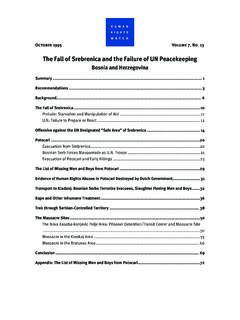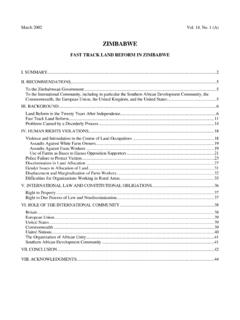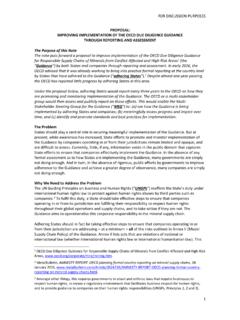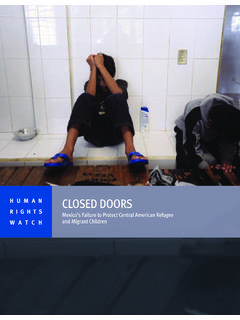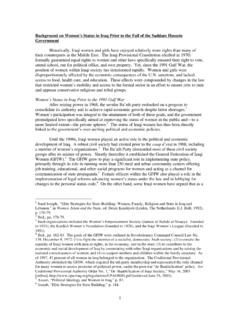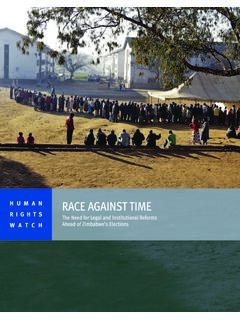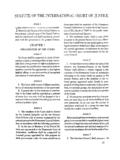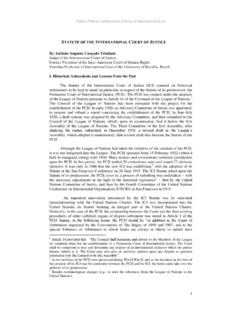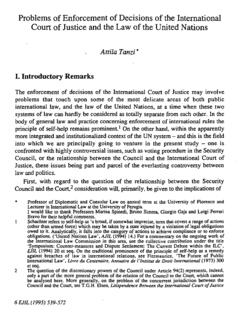Transcription of Beyond the Hague: The Challenges of International …
1 Beyond the hague : The Challenges of International justice By Richard Dicker and Elise Keppler During the 1990s, the International community took unprecedented steps to limit the impunity all too often associated with mass slaughter, forced dislocation of ethnic groups, torture, and rape as a weapon of war. Along with two genocides and many other widespread crimes, the decade was marked by the creation of International criminal justice mechanisms and the application of universal jurisdiction to hold perpetrators of the most serious crimes to account. Due to inherent difficulties in rendering justice for these crimes, there have been failings, but the new approaches have nonetheless made great strides. In the last few years, opposition to this nascent system of International justice has intensified and today the landscape is less hospitable to the types of advances that took place in the 1990s.
2 In this context, those supporting efforts to hold the world s worst abusers to account need to take a hard look at recent experiences to chart the path forward. The victims who suffer these crimes, their families, and the people in whose names such crimes are committed deserve nothing less. In so doing, it is necessary to emphasize that although International justice mechanisms provide imperfect remedies, they are a vitally necessary alternative to impunity. This essay proposes a perspective of the road ahead in light of both the successes of the recent past and current obstacles to further progress. A Developing System of International justice Soon after the end of the Cold War, with the horrors in the former Yugoslavia and Rwanda and the stark failures of national court systems freshly in mind, the United Nations, a number of governments, and many citizens groups and International nongovernmental organizations (NGOs) worked to create International criminal courts.
3 The Security Council created two ad-hoc International criminal tribunals, the International Criminal Tribunal for the former Yugoslavia (ICTY) in 1993 and the International Criminal Tribunal for Rwanda (ICTR) in 1994, to try alleged perpetrators of genocide, war crimes, crimes against humanity, and other serious violations of International humanitarian law in those particular conflicts. Affirming the viability of International criminal mechanisms after a fifty-year hiatus, the tribunals held perpetrators of crimes in the former Yugoslavia and Rwanda accountable. Suspects were arrested and tried before these tribunals regardless of their official status, leading to the first indictment of a sitting head of state, namely Slobodan Milosevic by the ICTY, as well as the indictment of the former Prime Minister of Rwanda, Jean Kambanda, by the ICTR.
4 The Rwandan and Yugoslav tribunals revitalized an International criminal jurisprudence that had not developed since the Nuremberg and Tokyo trials. In response to shortcomings in their performance, described in more detail below, the ICTY and ICTR improved their practice over time. By 2002, between four and six trials were taking place each day in the three courtrooms at the ICTY. Changes were also implemented to improve the functioning of the ICTR where major problems had persisted. In 2002, the capacity of the Rwandan tribunal increased when the Security Council amended the ICTR Statute to permit ad litem judges to serve in trial chambers. After a long delay, two senior posts in the ICTR Office of the Prosecutor were filled and a new president and vice-president were elected.
5 In September 2003, the Security Council separated the ICTY and ICTR prosecutor posts and appointed a separate ICTR prosecutor. The experience of the ad hoc tribunals revived an idea that first gained currency after World War II: the creation of a standing forum where justice can be rendered for the gravest crimes when national courts are unwilling or unable to do so (the latter limitation on jurisdiction is known as the complementarity principle ). In 1998, more than 150 countries completed negotiations to establish the International Criminal Court (ICC), a permanent International court charged with prosecuting war crimes, crimes against humanity, and genocide in such circumstances. Reflecting the dynamism of efforts to limit impunity during this period, the necessary sixty states ratified the court s treaty known as the Rome Statute to bring it into force in July 2002, less than four years after it had been opened for signature.
6 The establishment of the ICC, a huge step forward for human rights, has the potential to focus International attention on impunity for the most serious crimes of concern to the International community, as noted in the preamble of the Rome Statute. The court has engendered great expectations. While the ICC will face many obstacles in bringing justice , the most immediate threat to its effectiveness comes from the ideologically motivated hostility of the Bush administration. The government s campaign against the court, while both shameful and damaging, has nevertheless failed to derail the considerable momentum behind the ICC s establishment. To date, ninety-two states have ratified the Rome Statute and nearly fifty more have signed it.
7 In the brief period since the Rome Statute s entry into force, the ICC has moved from an institution on paper to a permanent court staffed with highly qualified judges and an experienced prosecutor and registrar. ICC officials familiar with the experience of the two ad hoc tribunals consciously drew on the lessons of those mechanisms to create a more efficient court. In July 2003, one month after taking office, the prosecutor announced he was following closely the situation in Ituri province of the Democratic Republic of Congo (DRC). Since there is incontrovertible evidence that the DRC currently lacks capacity to adjudicate cases involving serious human rights crimes, the situation there is precisely one of the scenarios the ICC was intended to address.
8 Over the past decade, several European states also began to meet their obligations to prosecute those found on their territory accused of atrocities. Using domestic universal jurisdiction laws in domestic courts, Switzerland, Denmark, Belgium, Germany and other states have tried such individuals far from the countries where the crimes were committed. In October 1998, the United Kingdom arrested former President Augusto Pinochet on a Spanish warrant charging the former dictator with human rights crimes committed in Chile during his seventeen-year rule. As a result, four states, Belgium, France, Spain, and Switzerland, litigated the right of their courts to try Pinochet. The arrest of Pinochet sparked litigation before the United Kingdom s highest court, the House of Lords, that resulted in the landmark decision that Pinochet, as a former head of state, could face prosecution for acts of torture in relation to crimes committed after 1988, when the United Kingdom became a party to the Convention against Torture.
9 A synergy developed between efforts to bring justice at the International level and access to national courts where the crimes occurred. There was a profoundly important spillover effect: national courts began to take on litigation of previously barred cases. The Pinochet litigation prompted an opening of the domestic courts in Chile to victims who had been denied access to remedies. In August 2003, trials of military officers responsible for gross violations of human rights during Argentina's dirty war were reopened in Buenos Aires. A Spanish judge prompted this development when he issued warrants for the extradition of forty-five former military officers and a civilian accused of torture and disappearances in Argentina so that they could stand trial in Spain.
10 The spillover effect has been particularly pronounced in countries that have undergone a thorough transition from authoritarian rule to democracy, such as in Chile and Argentina. But also in Chad, victims were emboldened by International efforts to indict former dictator Hiss ne Habr , leading them to bring cases before their national court against former Habr associates. These different developments taken together have formed the components of a new, fragile, yet unprecedented system of International justice consisting of ad hoc tribunals, the permanent ICC, and various other International mechanisms. These institutions promise an end to the impunity that perpetrators of some of the world s worst crimes have long enjoyed.
